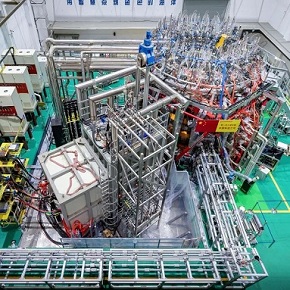 |
||
|
Chinese development model has alleviated concerns about nuclear safety Global Times, PUBLISHED 20.04.2025 Invited by the China Atomic Energy Authority (CAEA), Director General of the International Atomic Energy Agency (IAEA) Rafael Mariano Grossi visited China from Tuesday to Friday. During his trip, Grossi toured the Linglong One nuclear island in Changjiang, South China's Hainan Province, and engaged in open dialogues with students at Chinese universities. In interviews with Chinese media, including the Global Times (GT), Grossi expressed his surprise and admiration for China's progress and innovation in the nuclear sector. China's achievements in nuclear energy and its commitment to the safe application of nuclear power have garnered significant attention. What is your perspective on these developments? The nuclear sector in China has been experiencing significant growth across many areas. It has continued to advance its existing nuclear power program while also developing new technologies, such as small modular reactors. Recently, I visited Hainan Province in South China, where I had the opportunity to see the Linglong One, the world's first commercial onshore small modular reactor, which holds enormous promise both for China and for developing countries. What I see here is a very dynamic sector that is steadily gaining ground in the country's energy mix. I am very optimistic about this. To achieve such growth in nuclear energy, it is essential to have a very strong safety system, full adherence to international standards and a solid safety record. China has all of these elements. From the IAEA's perspective - as the body that sets these international standards - it is very reassuring to see that China's nuclear growth is firmly grounded in the observance of these rules, along with cooperation with us in these areas. As you mentioned, the IAEA is keen to maintain cooperation with China. What is your perspective on the future of collaboration between the two parties in the fields of nuclear security and safety? Nuclear security is an indispensable element of nuclear energy. We cannot have a technology that is so sophisticated without very stringent checks and norms to ensure that nuclear reactors are operated in a safe and reliable way. China has been placing great emphasis on this, as the country will soon have more than 100 nuclear power units in operation. The Chinese nuclear regulator and the CAEA have maintained close cooperation with the IAEA, actively engaging in our international meetings and in the ongoing processes of updating safety and security standards. We have been discussing developments such as small modular reactors and nuclear fusion. These advancements are contributing to the construction of a constantly evolving normative framework - a kind of safety net - through which any potential consequences can be effectively controlled. China advocates for establishing an equitable and inclusive market environment to advance the peaceful use of nuclear energy, ensuring that countries in the Global South can participate in international nuclear cooperation in an equitable and orderly manner. In your view, what potential benefits could this cooperation bring to other countries, particularly those in the Global South? Notably, nuclear energy is not only a priority for China. Many countries, especially those in the Global South and developing countries, are showing great interest in nuclear energy. Nuclear energy is compact, efficient and produces no greenhouse gas emissions, which makes it highly attractive for energy planning. Currently, only a limited number of countries possess nuclear technology and the capability to transfer or export it, and China is one of them. China's large nuclear corporations are expanding into international markets and are even becoming leaders in the industry. This is one of the reasons why I've been having discussions with the heads of Chinese nuclear corporations during my visit. At present, nuclear energy is mainly concentrated in large economies. However, with the increasing demand for energy security and clean energy, developing countries are looking at nuclear energy as a viable option. China, with its nuclear technology, is actively reaching out to Global South countries through initiatives like the Global Development Initiative (GDI), making nuclear technology a key area of cooperation. We can expect to see more activity from China's nuclear sector in international markets. I think that the GDI is naturally aligned with nuclear energy development. It is fully compatible with the goal of providing clean, affordable energy to as many countries as possible. As artificial intelligence (AI) continues to advance rapidly and consume increasing amounts of energy, how can its development be integrated with nuclear energy? AI and nuclear energy are, I would say, a very natural match. AI data centers require a stable, uninterrupted supply, and nuclear energy can provide exactly that, even more so, when we have technologies like small modular reactors, which might be set up in remote places. With this modularity, a nuclear power plant can serve not only a data center, but also a small town, or provide services like desalination or district heating. This year, the IAEA will hold the first international conference on AI and nuclear energy in Vienna. And I expect to have many participants from China. We've noted that Chinese universities are strengthening specialized personnel training in nuclear energy applications for Global South nations. What do you think about the academic collaboration involved in this initiative? This kind of exchange and cooperation is indispensable. Talent is the cornerstone of industry development. Technology cannot develop in a vacuum; it requires a well-prepared workforce, supported by the education system. That is why I have always actively promoted cooperation with educational institutions. During this visit, I went to Peking University, and on my previous visit, to Tsinghua University. I always try to engage with faculty and students, to understand their capacities. I believe education is the foundation of social prosperity, and it is also essential for cultivating the next generation of talent for nuclear development. I am filled with enthusiasm [when talking to students from those Chinese universities]. I see them so inspired and full of optimism. These days, we are living in such challenging times - tariff wars, geopolitical confrontation - and yet I still see in the eyes of these students a sense of possibility and optimism. And this is what we must focus on: how to guide this new generation, young generation, which will take charge over the next 20 or 30 years, to create better conditions for the world. When the going gets tough, it is not the time to abandon ship, it is time to stay calm and continue making efforts. As you've traveled to several cities in China in recent days, what has impressed you most during your travels? It has become a commonplace for me to visit. I come quite frequently, and I suppose it will be even more frequent in the future. What I find so inspiring and positive is the change I see - the change in the urban landscape, the change in the economy and the change in the attitude of people. I started coming to your country in the 1980s, so I've seen this transformation over the years, and I think it is a true source of optimism. For me, as the head of an international organization, China is a place where I need to be, and with whom I need to work. Beyond that, the warmth of the people, their hospitality, the food and everything else always make my visits here a very memorable experience. Topics: Asia, China, IAEA, Interview, Opinions Other news: Leaders of Global Nuclear Industry to meet at World Atomic Week in Moscow World Atomic Week international forum will take place From September 26 to September 30, 2025. Russia and Myanmar signed an intergovernmental agreement for the construction of SMRs 110 MW SMR project with the possibility of further expansion up to 330 MW. Russia and the IAEA hold another round of Interdepartmental consultations in Moscow The parties reaffirmed their commitment to continue contacts on a regular basis. |
Hero of the day 
China sets new records in the research of new-generation artificial sun HL-3 On March 28, the institute announced that its new-generation artificial sun HL-3 reached an atomic nucleus temperature of 117 million degrees Celsius and an electron temperature of 160 million degrees Celsius for the first time. INTERVIEW
Yuriy Chernichuk OPINION
Rosatom |

